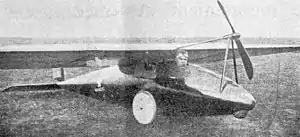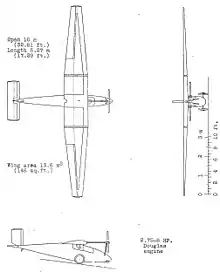Roter Vogel
The Roter Vogel is a German sailplane built in 1923 that was adapted for powered flight.[1]
| Roter Vogel | |
|---|---|
 | |
| Role | Motor glider |
| National origin | Germany |
| Manufacturer | Baumer Aero Company |
| Introduction | 1923 |
Design and development
The high-wing, Roter Vogel was first designed to be a conventional glider, and was adapted for powered flight with the smallest engine available at the time.
The Douglas engine was mounted flush inside the cockpit of the glider, with the prop driven by internal belts. The rudder and elevators were hinged to be a single movable surface.[2]
Operational history
Roter Vogel placed second in the 1924 Roene Germany Light Aircraft Contest.
Specifications (Roter Vogel)

Roter Vogel 3-view drawing from NACA-TM-301
Data from Sport Aviation
General characteristics
- Capacity: 1
- Length: 5.28 m (17 ft 4 in)
- Wingspan: 9.91 m (32 ft 6 in)
- Wing area: 13.6 m2 (146 sq ft)
- Aspect ratio: 7:4
- Empty weight: 180 kg (397 lb)
- Gross weight: 235 kg (518 lb)
- Powerplant: 1 × Douglas 350cc air-cooled motorcycle engine, 6.0 kW (8 hp)
- Propellers: 2-bladed, 1.47 m (4 ft 10 in) diameter
Performance
References
- Royal Aeronautical Society. The Journal of the Royal Aeronautical Society, Volume 29. Missing or empty
|title=(help) - Sport Aviation. March 1958. Missing or empty
|title=(help)
This article is issued from Wikipedia. The text is licensed under Creative Commons - Attribution - Sharealike. Additional terms may apply for the media files.